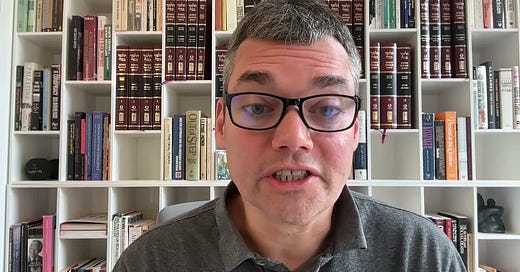For the foreseeable future, our Zoom calls will be held at a new time: Friday at 11 AM Eastern.
Our guest this week will be Raef Zreik, associate professor of Jurisprudence at Ono Academic College in Israel, a senior researcher at the Jerusalem Van Leer Institute, and a former member of the executive committee of Balad, one of Israel’s predominantly Palestinian parties. He’s one of the most brilliant theorists of Palestine and Israel, and I want to ask him to step back from the nightmarish events of the moment to talk about their long-term consequences for relations between Palestinians and Israeli Jews.
Paid subscribers will get the link this Tuesday and the video the following week. They’ll also gain access to our library of past Zoom interviews with guests like Rashid Khalidi, Thomas Friedman, Ilhan Omar, Benny Morris, Noam Chomsky, and Bret Stephens.
Sources Cited in this Video
Elliott Abrams’ essay in Foreign Affairs.
The Pew Research Center on Israeli opinion.
George Orwell’s “Politics and the English Language.”
Things to Read
(Maybe this should be obvious, but I link to articles and videos I find provocative and significant, not necessarily ones I entirely agree with.)
The Jewish Currents (subscribe!) podcast discusses secularism and the Jewish left.
Like so many people with family in Gaza, the political analyst Khalil Sayegh has endured unthinkable agony since this war began. He’s seen his father and sister killed. He’s trying to bring his remaining family members to safety. If you can help, please do. Please also consider helping the Alshawa family, which is sheltering in central Gaza and hoping to evacuate to safety.
A Holocaust survivor’s talk is cancelled in Detroit because he protested the Gaza war.
Mexico, El Salvador and their ironic relationship to Israel-Palestine.
The importance of the halakhic left.
Adam Shatz on Israel then and now.
A message about Noam Chomsky.
See you on Friday at 11 AM,
Peter
VIDEO TRANSCRIPT:
Hi. I’d encourage you to do an experiment. Go on Google or some other search engine, and type in the phrase, ‘Israelis feel’ or ‘Israelis believe.’ I suspect that what you’ll find is that many of the things that you turn up about how Israelis feel, or Israelis believe, are not actually statements about how all of Israel’s citizens feel, or what they believe, but are using essentially Israelis as a synonym for Jewish Israeli.
So, for instance, here’s one example in Foreign Affairs in April, Elliott Abrams, the former Bush and Trump administration official, wrote, ‘Israelis across the ideological spectrum agree that Hamas must be crushed.’ Now, he’s clearly using Israelis here as a synonym for Jewish Israelis. And it’s true that for Jewish Israelis that statement is probably true. A Pew research center poll in May found that only 4% of Jewish Israelis think that Israel’s war in Gaza has gone too far. But if you use Israelis to mean all of Israel’s citizens, then his statement is completely wrong because according to Pew, 74% of Israel’s Palestinian citizens or Arab Israelis, as they’re sometimes called, think that Israel’s war has gone too far.
So, what’s happening here is it that Americans in our public discourse are very often embracing the kind of ethno-nationalist language that comes from Israel. So, because Israel defines itself as a Jewish state, indeed the word Israeli itself, right, Israel is another name for the Jewish people. It’s the name that Jacob is given when he wrestles with the angel and becomes a name for the Jewish people. So, because the very name of Israel, and Israeli, is essentially a synonym for Jew, what happens is the fact that 20% of the Israeli citizens who are not Jewish gets erased from our public discourse, and we essentially adopt the terms of the ethno-nationalist terms of debate. And so, what we end up doing is we basically use Jewish Israeli as a synonym for Israeli, even though I think in the United States where Black Americans are only 10% of the population—significantly less than Palestinian citizens are of the Israeli citizenry—we would really object if someone used American and white American as synonyms. But essentially, we do a version of that when we talk about Israelis all the time.
And it’s an even bigger problem, right, when you realize that Israel controls millions and millions of Palestinians who don’t have any citizenship at all. That 70% of the Palestinians under Israeli control, those in the West Bank and Gaza and East Jerusalem, have lived under Israeli control, in many cases their entire lives, but can’t become citizens. So, we would never call them Israelis. And the problem here, I think, is that when we talk about other groups of people—let’s say Americans, right—we’d mean citizens, but we also mean perhaps a little more vaguely, just kind of long-term residents, people who are spending their lives here, people who are not tourists, right, even if they don’t have citizenship.
But in the United States, there’s more of a close alignment between those two categories. It’s true we have long-term undocumented people, but for the most part most of the people who are going to be here their entire lives are citizens. And so, we essentially talk as if the same thing is true in Israel. But in Israel, it’s really not true at all because Israel has controlled since 1967 these very large populations of Palestinians that can’t become citizens, and therefore would never be described as Israelis, right? And yet, in a certain sense, one should describe them as Israeli, again because they have lived their entire lives under the control of this state.
So, we would never say something like, you know, 50% of the Israelis oppose a Jewish state or oppose Zionism. But if we were to actually refer to all the people under Israeli control, 50% of whom were Palestinian, that would be a reasonably accurate statement. Again, it’s just that we would never think to call them Israelis, but the reason we wouldn’t call them Israelis is because Israel doesn’t extend them citizenship, and more deeply, because the very term Israeli itself has an ethno-nationalist connotation, which essentially erases Palestinians, the non-citizens, and even the citizens, right?
And I think the reason this is important is that one of the points that George Orwell makes in his famous essay, ‘Politics and the English language,’ is that if you want to critique the actions of a state, or the actions of people in power, you have to challenge the language that people in power create. That if you essentially replicate that language in your own usage, then even if you think you were in opposition to those policies, you were actually complicit with that power structure because you are using its language and accepting its terms of debate. And that’s why I think if we want to question the idea of an ethno-nationalist project, the idea of Jewish supremacy, the idea of a state that has a different legal regime for Jews and Palestinians—most blatantly among those Palestinians who don’t have citizenship, but even in significant ways for that minority of Palestinians who do have citizenship because they are not equal citizens in a state that has a special set of responsibilities to members of one ethno-national group—we have to be explicit in the language we use and not simply erase Palestinians from our discourse when we use the term Israeli.
And so, I think this is something for us to think about as we go forward, and we try to have a better American public debate about what genuine liberal democracy and equality under the law might mean for people in Palestine and Israel.










